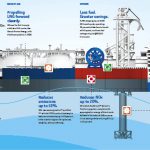The GE group aims to strengthen its power and propulsion activities in shipping markets. Tim Schweikert, CEO of GE Marine, talked to HANSA about growth potentials and his view on the shipping of the future
What is your mid- and long-term strategy to cope with the huge challenges in the maritime industry?
Tim[ds_preview] Schweikert: We have seen these sorts of cycles in other segments before and we don’t see them as »the end of the world«. What we do is to ask ourselves what we can do to win a share of the smaller pie, especially for the time when the market is going up again – there are a couple of things. Externally we do see a lot more opportunities for collaboration, I think customers are very interested in that in these difficult times. One example is the recently signed long-term cooperation agreement with Zentech, an engineering consulting, project and construction management company.
Internally we have our »GE Store«. There we leverage all the technology within the GE industrial portfolio to see how we can apply this to be more innovative in the marine space. We made a big investment in the Internet of Things. In the marine business, we focus on three digital areas: Asset Performance Management with a focus on improving non-productive times and also reducing costs from looking at opportunities to go from counter-based maintenance to condition-based maintenance. The marine industry is still very conservative.
What else do you focus on?
Schweikert: The second area is energy optimisation, like we do it in our rail transportation or aviation businesses. The third – which is kind of on the horizon, but which I think is very interesting – is autonomous vessels.
You mentioned collaboration. Will we see GE participating in more consolidation projects like acquisitions?
Schweikert: I can’t be specific, but I can say, that we made a big acquisition with Alstom, which is completed. However, our chairman said that we are going to continue allocating a significant amount of capital to do more acquisitions across the industrial portfolio, including the marine business. On a collaboration level, I think we will continue to look into partnerships to be more innovative. Another example is the recently announced Approval in Principle (AIP) by Lloyds Register for an application for container vessels, which we jointly developed with Dalian Shipbuilding. It is for a design running with our Combined Gas Turbine Electric and Steam (COGES) system, which is based on our aviation technology. This technology allows the vessel to run on LNG and is very competetive in terms of OPEX and CAPEX and frees up a lot of space. It weighs 80% less than a traditional diesel engine, 30% less volume is required. That allows to rethink the vessel design.
Where else do you see growth potential for power systems? Would battery or fuel cell systems be a possible market for GE?
Schweikert: Yes. We strongly believe emissions continue to be a very significant issue. In this respect, LNG will be a big trend and I think we are going to hit an inflection point as soon as the infrastructure is there. A lot of players are working on that and in the next five years we will see a lot of movement. Another topic is electrification, and I think we will see the trend toward more of that will continue. For hybrid technologies we have a couple of pilots going on, where we are looking at integrating battery systems into electronic propulsion systems.
Do you see yourself prepared for the competition in the market for LNG or hybrid systems?
Schweikert: It is a space that we are exploring right now and I think there is potential to do more organically as well as inorganically on the hybrid side. And there is potential on the enterprise level. We talked about hybrid, LNG and digitalisation. All these can be stitched together there.
Are there any new markets GE is aiming to step in?
Schweikert: I think digitalisation and LNG are very interesting and emerging markets. Another one is power vessels. There is a lot of activity going on, especially in emerging states to build power plants, which basically can be built on a vessel or a barge. You can build it faster and it is more flexible.
A lot of players are working on digitalisation, Big Data and automation. What do you think: where is the maritime industry going to go in this respect?
Schweikert: I think it is going to be somehow revolutionary. Think about marine operations: Downtime is very expensive, harsh environments, remote locations, you have a dwindling interest of people to spend a long time on vessels. It seems to be that it is a very good time to leverage this technology. I think we will see a lot of change in the three segments APM, energy optimization and autonomous vessels. Do we really need a big bridge or big parts on board for accommodation?
Some people say that in ten years we will see the first completely unmanned ships and in twenty years 20% of all merchant vessels will be unmanned and autonomous…
Schweikert: The challenge of autonomous operation is not so much technologiy, it is more the cultural acceptance and the regulatory parts. But I think there is a lot that you can learn from the airline industry, which used to have much bigger crews. A lot will happen within the next five years, but whether it goes to fully automated or not, what we are going to see is a great opportunity to improve safety and to rethink vessel design.
Michael Meyer


















